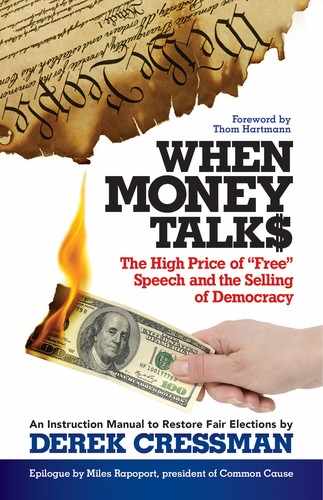Epilogue
Money in politics is nothing new. But the current dominance of big dollar donors, their identities and motives largely hidden from public view, is a new and dangerous development for American democracy.
As Derek Cressman describes in this book, the trouble goes back to the Supreme Court’s 1976 ruling in Buckley v. Valeo, which first equated money with speech. The justices made things worse with their 2010 decision in Citizens United.
Rather than uniting citizens, as the name of that infamous ruling might imply, the decision reflected a Court majority united against citizens. Rather than protecting democracy, Chief Justice Roberts and his allies are serving the wealthiest and most powerful among us.
It is not just in campaign finance that the Roberts Court is undercutting democracy. The Court in 2013 struck a blow against the Voting Rights Act, in Shelby County v. Holder. In 2014, it extended the logic of its holding that corporations are people in the Hobby Lobby case, ruling that a corporation could use a claim of religious freedom to evade the Affordable Care Act. I believe that all these decisions will one day be spoken of in the same breath as the infamous Dred Scott decision, and will be reconsidered and overturned by a future Supreme Court.
Past Supreme Courts have had many justices with experience in governing and campaigning. Earl Warren was governor of California prior to serving as chief justice; Sandra Day O’Connor was a former Arizona state legislator. None of today’s justices have experience running for or serving in office. Their lack of understanding of the other branches of our government is telling.
The Roberts Court has upheld restrictions on state judges personally asking for campaign funds, correctly reasoning that such contributions could taint the public’s view of the judiciary. But Chief Justice Roberts apparently sees no problem with legislators raising huge sums of money or benefiting from unlimited campaign spending by corporations and billionaires. It is as if he and his brethren expect our politicians to be corrupt and see no point in trying to prevent it.
Polls have consistently shown that strong majorities of Democratic, Republican, and Independent voters support limits on political spending. The politicians are beginning to get the message. Democrats Hillary Clinton and Bernie Sanders, as well as Republican Lindsey Graham, highlighted their opposition to Citizens United in the early stages of their 2016 presidential campaigns.
With public opinion overwhelmingly on our side, the question is how long must democracy suffer before the Supreme Court’s mistake is corrected. It will require a determined, sustained effort, but the goal—a constitutional amendment overturning Citizens United and permitting reasonable regulations on political spending—is within reach.
When Senate Majority Leader Mitch McConnell spoke to a room full of billionaires convened by the industrialists Charles and David Koch, he reportedly told them that the worst day in his political life was when then President George W. Bush signed the McCain-Feingold law, which limited independent political spending.
Senator McConnell has called a constitutional amendment to overturn Citizens United radical; it is anything but. In a few sentences, we can restore an understanding of the Constitution that was in place for at least a century until recently unraveled by the Supreme Court. An amendment would simply reaffirm what we all know—that money is not speech and that no one, however wealthy or powerful, has a constitutional right to spend unlimited sums to influence our elections.
McConnell argues that proposals to limit political spending are aimed at silencing critics of government. Nonsense. As Derek Cressman has explained, limiting campaign money would protect the First Amendment; every citizen’s right to express their views, however unpopular or unconventional, would remain intact.
The real radicals are those who argue that their free speech rights are a license to use wealth to drown out the voices of other Americans and buy our elections. They view the Citizens United decision as having, in Senator McConnell’s words, “level[ed] the playing field” for corporations.
Americans know better. Already, sixteen states and some 650 localities have called on Congress to send the states a constitutional amendment overturning Citizens United. In two states, Colorado and Montana, voters sent the message directly, through ballot measures that Derek Cressman helped lead when he was a vice president at Common Cause. We can thank Derek for his early, strategic thinking and organizing that built momentum for a constitutional amendment as the people’s solution to the problem.
In the fall of 2014, fifty-four senators cast votes signaling their support for an amendment, effectively declaring that big ideas, not big money, should rule in the public square. The vote was a historic milestone, but much remains to be done to secure the two-thirds majority in Congress that would send the amendment to the states for ratification.
When Money Talks calls on all of us to reflect on what has gone wrong with our elections. Now comes the time for action. As Common Cause’s founder John Gardner said years ago:
Our society must have the wisdom to reflect and the fortitude to act. It must provide the creative soil for new ideas and the skill and patience and hardihood to put those ideas into action.220 (emphasis original)
This book contains many ideas, new and old, for action. It is up to us to find the skill, patience, and determination to carry those ideas forward. A plethora of organizations, Common Cause among them, are pursuing different approaches to solving the problem of big money in politics. These groups are listed in appendix I. Some are focusing on improving disclosure of political spending and using public funds to augment the role of small donors; others are leading the fight for a constitutional amendment. It’s all important work. I hope you’ll search out the organizations that best suit you, and then roll up your sleeves and get to work.
